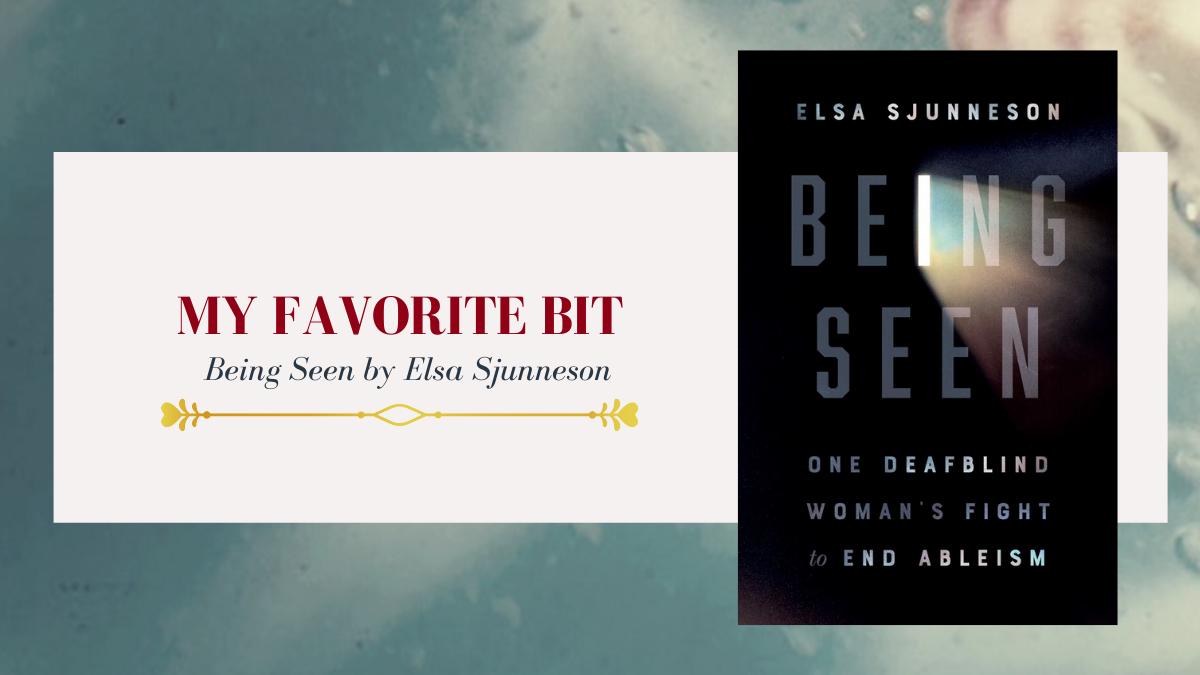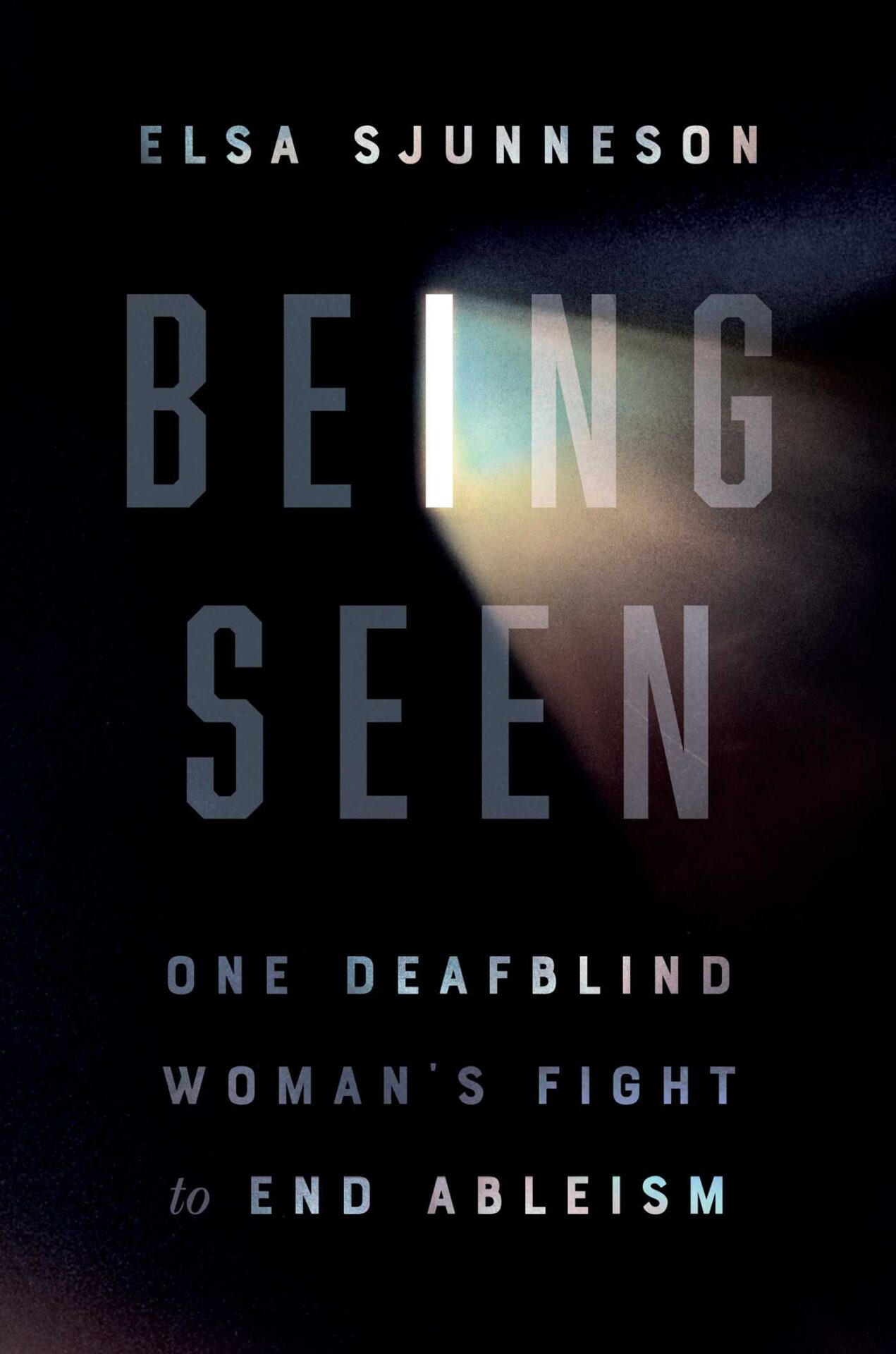
Elsa Sjunneson is joining us today to talk about her memoir, Being Seen. Here’s the publisher’s description:
A deafblind writer and professor explores how the misrepresentation of disability in books, movies, and TV harms both the disabled community and everyone else.
As a deafblind woman with partial vision in one eye and bilateral hearing aids, Elsa Sjunneson lives at the crossroads of blindness and sight, hearing and deafness—much to the confusion of the world around her. While she cannot see well enough to operate without a guide dog or cane, she can see enough to know when someone is reacting to the visible signs of her blindness and can hear when they’re whispering behind her back. And she certainly knows how wrong our one-size-fits-all definitions of disability can be.
As a media studies professor, she’s also seen the full range of blind and deaf portrayals on film, and here she deconstructs their impact, following common tropes through horror, romance, and everything in between. Part memoir, part cultural criticism, part history of the deafblind experience, Being Seen explores how our cultural concept of disability is more myth than fact, and the damage it does to us all.
What’s Elsa’s favorite bit?

ELSA SJUNNESON
Before I was a science fiction writer, or a media critic, I was an obscenity law scholar. I studied the history of burlesque, sex work, legislation regulating women’s bodies, and the long standing history of pornography. We have, in fact, always been horny in this castle. Trust me, I would know.
Everyone, in fact, can be horny, if they want to be (Ace folks, I see you, you’re valid, don’t worry I know you exist). Which is why we’re going to talk about the chapter that I didn’t want to write. I never thought I’d be writing this sentence, before G-d and everybody, but here we are.
My favorite bit of my book, Being Seen, is the sex chapter.
It’s the chapter that I have told my mother, my grandmother, my childhood babysitters and some friends not to read. Perhaps it seems silly for a scholar of the unmentionable to have shied away from talking about it, but let’s be honest: talking about sex is really hard.
When I started writing Being Seen I tried to convince myself that I didn’t need to write a chapter about sex, romance and dating. I didn’t want to do that in the middle of a memoir-slash-cultural-criticism because to be honest, I didn’t want to talk about my own sex life.
But as I worked through the book, I realized that there was absolutely, one hundred percent, going to have to be a chapter about sex. Because in the romance genre and in romantic subplots in other genres, disabled people are denied pleasure.
Society denies us access to pleasure.
Disabled people aren’t included in sex education classes, from either an access perspective (how does a blind person put on a condom is a question left unanswered in sex ed, for example), or from teaching non-disabled people how to have sex with us. No one mentions that wheelchair users can have sex in a public school sex ed class – and why not?
Because non-disabled society gatekeeps who gets access to pleasure in our society and in our fiction.
I fought myself to write this chapter. I wrote and re-wrote sections to make sure that I revealed just enough to make it realistic, but not enough that I didn’t feel comfortable. A little like a burlesque act with words. Part of what I had to fight was the idea that I wasn’t supposed to write about this at all. That it wasn’t seemly, or proper. Not that I’ve ever been particularly wedded to the concept of proper, but sometimes it sneaks up and whispers into my ear – I think it does that to everyone.
With books, we don’t get second chances to re-write them, and I knew that I would regret it if I didn’t talk about how disabled women not only experience pleasure, but they deserve it.
As uncomfortable as it is to have written about my own sexual experience, I am proudest of the work that I did to expose the reality that disabled women are worth loving – not just emotionally, but physically.
I was honest. Honest about what it is like to be me, in the body that I live in, in a world that values ability as a sexualized trait. It is hard for disabled people to date. Disabled people still don’t have marriage equality. When we are on dating apps, we are asked questions like “can you have sex?” or told things like “I don’t think I can handle that.”
I’m proud of my honesty. Even if it was hard. Even if I never want to talk about it in public. Even if, for the rest of my life, I hope that people just skip that chapter and never tell me they read it.
I made it clear that there is a reality to being a disabled woman that is not what you imagine. That often, our fiction (and even our reality) denies that disabled women can, and do, experience pleasure.
I hope you read it.
And I really hope you don’t want to talk to me about it later. Don’t make it weird, okay?
LINKS:
Being Seen Universal Book Link
BIO:
Elsa Sjunneson is a Deafblind author and editor living in Seattle, Washington. Her fiction and nonfiction writing has been praised as “eloquence and activism in lockstep” and has been published in dozens of venues around the world. She has been a Hugo Award finalist seven times, and has won Hugo, Aurora, and BFA awards for her editorial work. When she isn’t writing, Sjunneson works to dismantle structural ableism and rebuild community support for disabled people everywhere. Her debut memoir, Being Seen: One Deafblind Woman’s Fight to End Ableism, releases in October of 2021 from Tiller Press.
